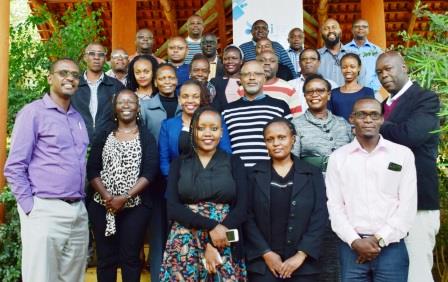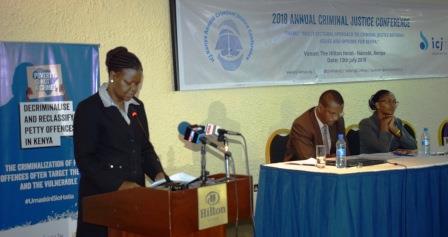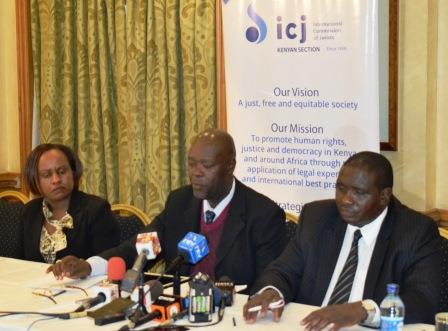Opportunities for Innovative Lawyering to Safeguard Community Rights
ICJ Kenya identified environmental governance as a thematic and strategic area of focus in its 2016-2020 Strategic Plan. In order to contribute to interventions in the thematic area through capacity development, in 2015, ICJ Kenya held the first in a series of its Jurists forums that sought to examine emerging governance challenges in the extractive in Kenya. The forum aimed at providing lessons for Kenya through comparative experience and best practices. A key resolution arising from the Jurists forum was to not only ensure continuous capacity development of its membership but also the need to interrogate the role of lawyers in safeguarding community rights and emerging public interest discourse the extractive sector. Further, it was resolved that spearheading access to information as a tool to foster transparency and accountability in the extractive sector would remain a priority for ICJ Kenya.
ICJ Kenya held the second in the series of Jurists forums on 11-13th July 2018 at the Sagana Getaway Resort aimed at interrogating the current legal and policy trends in the extractive sector The objectives of the forum was to enable ICJ Kenya members understand the current state of legislative and policy frameworks in the extractives industry in Kenya and to interrogate role of lawyers in safeguarding community rights and public interest in extractive governance and re-examine the role of lawyers in safeguarding community rights and emerging public interest.
Drilling past the resource curse
In April 2018, ICJ Kenya launched its publication titled: ‘Drilling Past the Resource Curse? Essays on the Governance of Extractive in Kenya1 as a contribution to knowledge products that focus on extractive sector in Kenya. The publication examines the causes of economic, social and political challenges and concludes that the root cause is the failure of governance institutions despite the existence of progressive constitutions and legislative frameworks. The essays interrogate concepts such as benefits sharing models, effects of extractives on the environment, and the role of access to information in the governance of extractives.
Through generation of knowledge products and legal text, advocacy and awareness creation, ICJ Kenya will continue to contribute to the discourse on the governance of extractives in Kenya. The underlying objective is to promote transparency and accountability that would guarantee that public interest in the discourse is safeguarded, in particular community rights thereby contributing to national and regional in line with the Sustainable Development Goals.
Although Kenya has made significant steps in developing policy and legal frameworks governing the EI sector, it is becoming increasingly evident that citizens are not only unaware of the existence of these frameworks but also are unable to access information to foster meaningfully engagement with duty bearers undertaking extractive activities in their respective regions. The lack of access to information deprives citizens of their rights to fully benefit from extractive activities yet, the extractive sector in Kenya has grown exponentially as a result of discovery of oil, coal and titanium in Turkana, Kitui and Kwale respectively.2 Although a step in the right direction, the existing laws and policies fall short of taking into account, the interests of local communities.
Community Protests
Most recently, protests by angry residents in mining communities have been witnessed in the country. In Turkana County for example, production of oil from the oilfields started on 19th May 2018, when an agreement was reached on revenue sharing between the government, the county government and the community. During the flagging off ceremony, the Governor announced that the leadership and the people of Turkana fully supported the exploration and production of oil, and that the impediment on the revenue sharing in the Petroleum Bill had been discussed and resolved.
However, Turkana residents have held numerous protests and blocked trucks transporting oil from Ngamia. The protests are over displacements, jobs, tenders, insecurity and the community’s share of proceeds. According to the residents, the negotiated share of 5% should be channeled to their bank accounts, while the rest is allocated to the county government is spent on development. Their argument is that the best security for oil is a satisfied host community. In Kwale County, protests have sparked over the recent months against titanium mining with the residents refusing further exploration of minerals in the area. According to the communities in Kwale, no benefit has accrued to them from the operations of Base Titanium and they are afraid that further resettlement are in the offing due to the ongoing exploration by the company.
These protests reveal several underlying root causes and confirm the identified challenges above that continue to fuel conflict and deepened antagonism between, host communities, County and national governments. They compound the problem of governance in extractive sector which include but are not limited to; lack of existing policy or legislative frameworks that cover artisanal extractives, violation of fundamental rights and freedoms of the citizenry, the imbalance of power relations and disparity land acquisitions, scope and depth of local content, revenue sharing formula, contract negotiations and payment of royalties.
The observations of ICJ Kenya is that there is a missing link: the role of Jurists in safeguarding community rights and emerging public interest matters in the extractive sector that are in line with ICJ Kenya’s vision and mission. This is in spite of the fact that ICJ Kenya has continued to engage in advocacy to ensure meaningful community participation and engagement by policy makers in the governance of extractives sector through utilisation of the right to access information. This is premised on the presupposition that with the right skills and tools, the citizens would be better placed to question, demand transparency and accountability from the duty bearers.
Beyond the challenges, there exist opportunities for Jurists to contribute to formulation of extractive sector policies, legal audit of existing frameworks such us on fair compensation and due process in relocations of affected communities and compliance with international and regional human rights standards to mention but a few.
“Transparency is a necessary ingredient for the achievement of accountability and good governance in the management of natural resources. Good governance is the only way to avoid the pitfalls so often associated with natural resources in the developing world. It is therefore imperative that Kenya positions itself well to ensure the benefits accrued from the natural resources outweigh any costs on the economy, society and affected communities.” said ICJ Kenya Chairman Kelvin Mogeni











